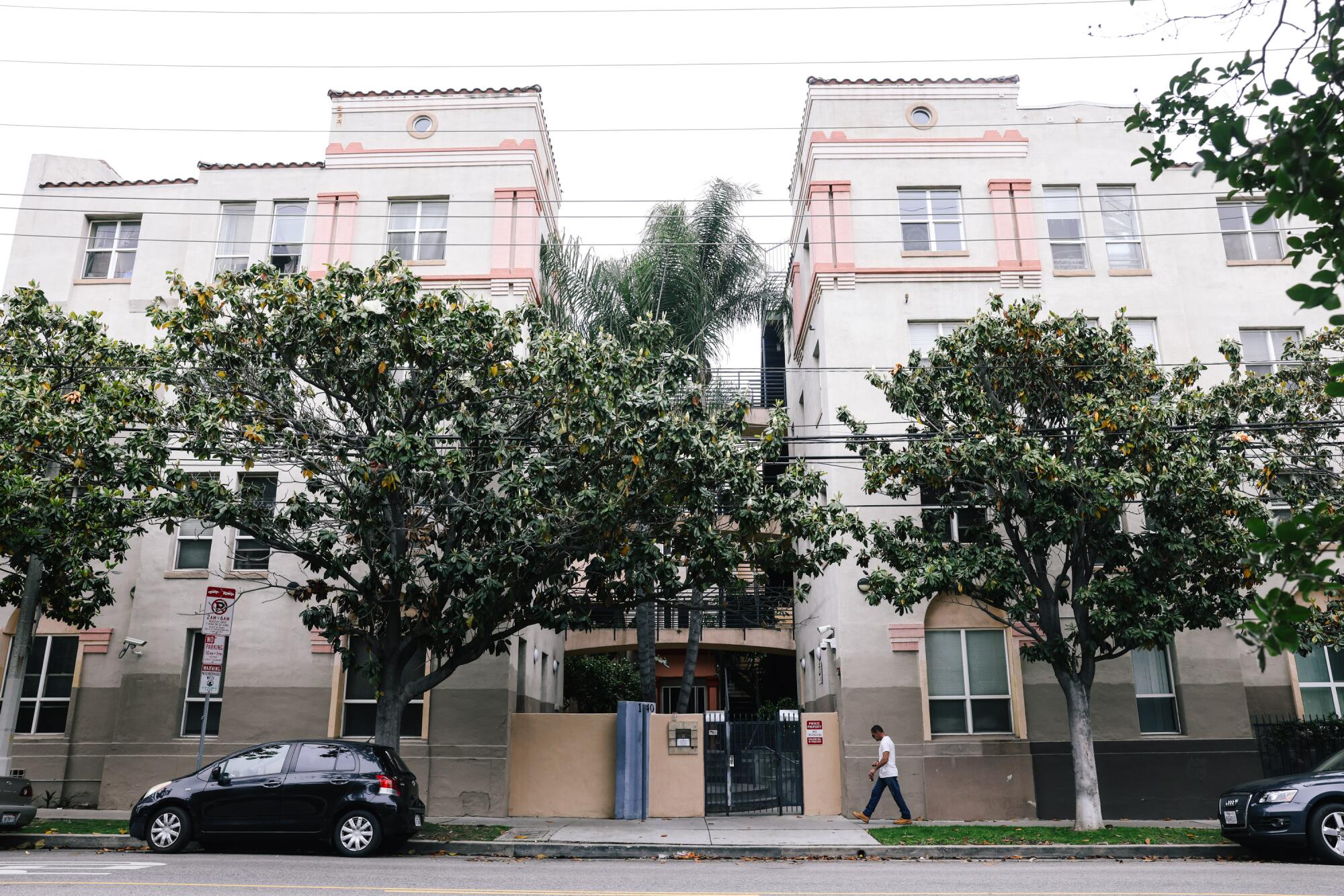
- Share via
WASHINGTON — With a broken elevator and a spotty HVAC system, the Gower Street Apartments badly needed some updates when the building’s owner received a surprising call earlier this year. A city housing official suggested that perhaps Congress could fund repairs to the supportive housing development for formerly homeless people.
After years of being scorned in Washington, the rebirth of congressional earmarks could help address a common conundrum confronting that building and other affordable housing developments: Lenders and governments make lots of money available to construct new housing but not to refurbish residences that already exist.
And yet that February call was the first time anyone had suggested turning to Congress for help. Community of Friends, the nonprofit owner of the Hollywood apartment building that houses 50 low-income people, many of whom are elderly or disabled, has “never received an earmark that I’m aware of in our history,” CEO Dora Gallo said.
The $3 million that could flow from Washington, D.C., to Los Angeles to spruce up the Gower Street Apartments, which were built in 1930 and became supportive housing in 1997, exemplifies one way Mayor Karen Bass is using her experience in Congress to try to address the city’s most pressing problem.
For the record:
4:24 p.m. June 5, 2023An earlier version of this article said Rep. Adam B. Schiff requested a $4-million earmark for the Gower Street Apartments. It was $3 million.
Earmarks, which are now known as Community Project Funding, were brought back in 2021 after a decadelong ban in Congress. Their return rekindled a debate over whether lawmakers should be allowed to direct tax dollars to favored projects in their districts — a debate that is, somewhat surprisingly, playing out among three California Democrats vying to succeed Dianne Feinstein, who is retiring from the U.S. Senate after more than three decades.

Bass asked every member of the House and Senate who represents Los Angeles to use one of their allotted 15 annual earmark requests on a project relating to the homelessness and housing crisis that her team had identified in their district. The $40 million in requests, according to Bass’ office, amounts to crumbs in the multitrillion-dollar federal budget.
Next year, though, with more time and planning, Bass hopes she can coordinate more requests.
“It’s important for the city to look for resources from every level of the public sector, and this is one method of bringing resources to the city from the federal government,” Bass told The Times.
“I served in Congress for 10 years before we got community projects, and, unfortunately, I only had two years’ worth,” Bass said. “I wish that I had been able to deliver resources directly to the district the entire 12 years I was there.”
Nearly $20 million —or about half the funding that the L.A. delegation and California’s senators are requesting — would go to augmenting Inside Safe — her signature effort to move unhoused Angelenos into hotels, motels and other facilities.
“This is a more direct way to get to the finish line,” said Sen. Alex Padilla, who, along with Feinstein, put in the funding requests for Inside Safe.

These asks are the first step in a long process that will determine what makes it into the final spending bill later this year. There are no guarantees, and even some reasons to worry.
Still, Bass is hopeful. Since 2021, California’s congressional delegation — even some Republicans — has won earmarks to renovate affordable housing, build new shelters and fund a litany of programs to help homeless people.
“The process was sort of made more coherent, and more transparent,” said Steve Berg, chief policy officer for the National Alliance to End Homelessness. “There’s always some things that the community really needs that none of the federal programs are paying for. The earmarks can be used to fill that out.”
Last year, when Democrats controlled Congress, the final budget included about $9 billion of earmarks, with about $775 million going to California and $1.75 billion flowing nationwide to “efforts to prevent homelessness, expand affordable housing, and improve community infrastructure,” according to a U.S. Government Accountability Office report. This year’s budget includes about $15 billion in earmarks.
This year, earmark requests are buffeted by twin challenges and uncertainties. Republicans, who control the House and the budget process, want to reduce federal government spending. And the recently announced deal to allow the federal government to continue borrowing money includes caps on spending for domestic programs like the ones that would fund homelessness.
The Democratic mayor of Los Angeles and the GOP House speaker have been friends for nearly 20 years. Will that bipartisan bond help Los Angeles in a divided Congress?
Last fiscal year, spending on earmarks was capped at 1% of discretionary spending, and this year, under Republicans, it cannot exceed .5%. Because they’re in the majority, Republicans are expected to get a larger proportion of the earmarks awarded even though their members put in far fewer requests.
These changes — including limiting the scope of what sort of projects can be approved — have made it more challenging to make the requests, members said. Connecticut Rep. Rosa DeLauro, the ranking Democrat on the House Appropriations Committee, warned colleagues in a mid-May letter that earmark requests could be whacked by as much as 70%.
Despite the uncertainty, Bass continues getting projects primed and ready to go in case the funding is approved.
A portion of the money the mayor has gotten former colleagues to request would go toward renovations, funding pilot programs for substance use treatment and in one instance a $10-million request from Rep. Jimmy Gomez (D-Los Angeles) to demolish a city-owned parking structure so it can be replaced with a supportive housing project.
In the case of Gower Street Apartments, the $3-million funding request came from Rep. Adam B. Schiff (D-Burbank) — who is running to replace Feinstein in a field that includes two Democratic congressional colleagues, Reps. Barbara Lee of Oakland and Katie Porter of Irvine. In an interview, Schiff said the earmarks allow him to have a direct effect on the community he serves.
His office has sought out projects that might have a gap in their funding and help vulnerable populations.
“My feeling is if I can help my constituents, I’m going to do it, and that’s more valuable to me than a talking point,” Schiff said.
Lee has also put in a slew of requests, including one request for about $3 million to be spent on an interim homeless navigation center with shelter and housing units in San Leandro.
She has a history of defending earmarks, even when it puts her at odds with her own party’s leader. During his 2011 State of the Union address, President Obama said he would veto any bill containing earmarks in an effort to “rebuild people’s faith in the institution of government.” Lee disagreed with this move and recalled in an interview sending Obama a letter chiding the president for doing something that would prevent members like her from bringing resources to her community.

On any number of policy debates, the top three Democratic rivals in the Senate race hold many of the same views, but here’s a rare subject where they differ.
Schiff and Lee are all in on earmarks. Porter is the only House Democrat who didn’t submit any requests during the last Congress.
Her opposition to what many conservative members call “pork” represents one of the clearest differences between the Irvine congresswoman, who won in a hotly contested swing district, and her two opponents who represent safe Democratic territory.
Porter argues this method of funding can be a wellspring of corruption, citing former Rep. Randy “Duke” Cunningham (R-Rancho Sante Fe), who went to prison for taking millions in bribes to direct earmarks to certain projects.
“The folks in the administrative branch have all the data on what programs work best, and where the money is most needed, and how best to deliver it,” Porter said. “I think they are better positioned and can do it in a more transparent and fair way.”
Porter’s opposition put her in line with many of her Republican colleagues who rail against the programs. Earmarks were banned in 2011 during the apex of the conservative tea party movement and after scandals over spending that was deemed excessive. But since they returned, more members of the GOP have been using them.
Her objection to earmarks drew the ire of several Democratic colleagues who accused Porter of grandstanding and opening up members to criticism from Republicans, according to multiple sources who were granted anonymity to speak freely about another member.
More than 40% of voters say Feinstein should resign, and just 27% say she should finish her term. Two Democrats and a Republican are in a tight race to replace her.
Fellow members were particularly incensed because her initial dissent came in the form of an op-ed in the Wall Street Journal. Several members of the California delegation noted that when earmarks returned, there were new restrictions on what was eligible and more disclosure requirements, as well as a ban on funds going to for-profit entities.
“I salute the guardrails. I think they are an improvement. But at the end of the day,” Porter said, “am I better situated than the Army Corps of Engineers to know where a pier needs to be or to know where coastal restoration work needs to occur?”
Rep. Brad Sherman’s eyes bulged when he was told of his Democratic colleague’s opposition to these earmarks. At Bass’ behest, the longtime San Fernando Valley congressman put in a request for $3.8 million to renovate a 42-unit supportive housing complex in Canoga Park. He also requested $3 million to help nonprofit Hope of the Valley buy 30 units of modular housing.
Since earmarks returned, Sherman has obtained about $11 million for housing projects. Sherman is unapologetic in the view that if the federal government is going to spend money, it should be spent either in or near his district, and the Northridge Democrat is more than happy to have any federal money Porter forgoes for her Orange County district diverted to the San Fernando Valley.
“Porter won’t use them? For God’s sakes, that money should go to the Valley,” Sherman said. “I think I know the Valley better than anybody else here in Washington.”
Like Sherman and others, Rep. Sydney Kamlager-Dove (D-Los Angeles) appreciated the nudge she got from Bass — whom she replaced in Congress and called after they both took office to talk about earmarks and homelessness.
The mayor asked Kamlager-Dove to put in a request for about $1.8 million that would be used on renovations of a building in her district that houses formerly homeless people. She put in another request for $2.6 million to help a synagogue in her district build 55 units of subsidized apartments for seniors.
“She called and said, ‘I need your help,’ ” Kamlager said.
More to Read
Sign up for Essential California
The most important California stories and recommendations in your inbox every morning.
You may occasionally receive promotional content from the Los Angeles Times.
















